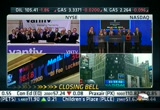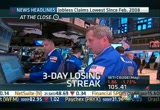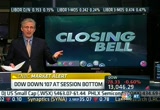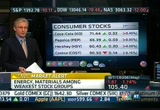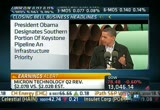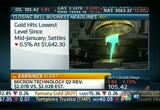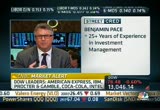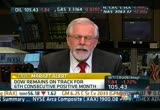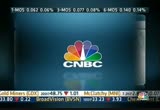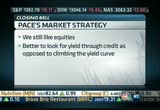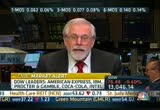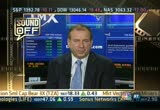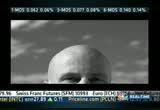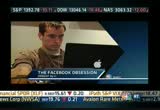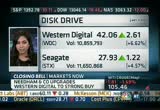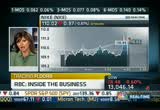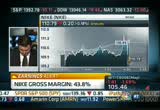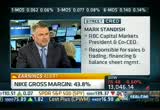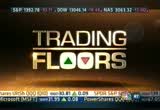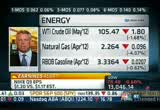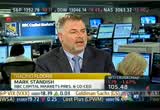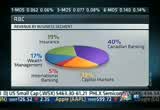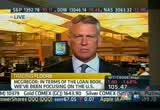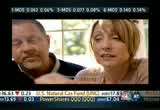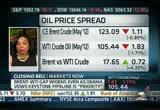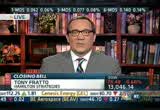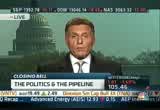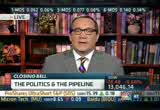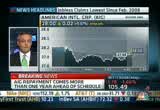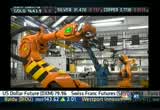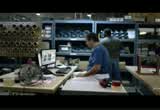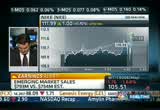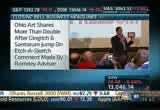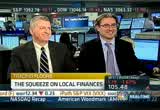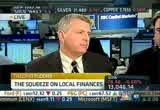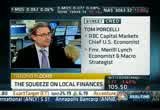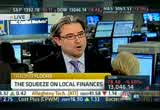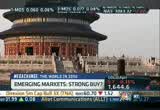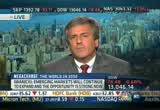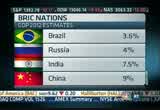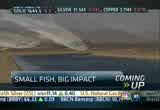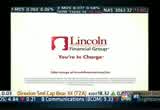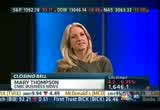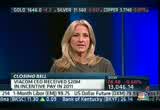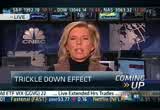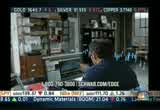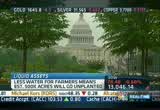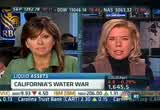tv Closing Bell With Maria Bartiromo CNBC March 22, 2012 4:00pm-5:00pm EDT
4:00 pm
bell. we'll have that for you are and the market reaction with the dow down 77 points. i'll see you tomorrow. maria continues from the rbc capital trading floor with the second hour of the trading floor. r. and and it is 4:00. coming to you live from the rbc floor in new york city. coming up after the program, i'm talking to the firm ceos getting their market outlook and emerging market expansion plans. we'll talk fixed income plans as well and where rates are headed. on wall street, the dow and s&p 500 both extend the losing streak to a third session in the low. we are finishing off the lows of the session. now on pace for the biggest
4:01 pm
4:02 pm
we got disappointing europe's manufacturing numbers. early this morning with the euro dropping rather dramatically, our futures dropped and we never recovered. it's pretty simple. what side of the global growth story are you on? today the glass is half empty. transportation index, the worst day that we've seen in the year so far you can see all of the concerns on slower global
4:03 pm
growth. and finally a big ipo. put up the exact target. priced at $19, opened at 23. look, closed right at the highs today. $25 and change. the other one is vanta. that price at $19. excuse me. 17. start trading at $19 and change. look at that. never really looked back. two big ipos. two of them closed on very strong terms. maria, back to you. >> bob, thank you so much. let's take a look at the other business headlines we're covering. president obama is pushing federal agencies to speed up a 485 mile pipeline. trans canada says it hopes to complete that $3.2 billion pipeline next year. the president is on a four-state tour and is defending his administration's energy policy. >> the fact is, that my administration has approved dozens of new oil and gas
4:04 pm
pipelines over the last three years, including one from canada. as long as i'm president, we're going to keep on encouraging oil development and infrastructure and we're going to do it in a way that protects the health and safety of the american people. we don't have to choose between one or the other. we can do both. >> well, the administration is facing some sharp criticism after it rejected the full keystone project back in january. those are due to environmental concerns and gas prices are climbing and continuing to climb. the panel of experts about 10 minutes from now. stay with us on this important story. meanwhile, light sweed crude oil lowered after disappointing manufacturing data. settled at a level of $105.35 a barrel. the dollar gets a boost and that is because european manufacturing data as well.
4:05 pm
the precious metal falling. gold has lost 4% in the last month. it's holding on to year to date gains on the price of gold. ben pace is u.s. chief investment officer. also joining me is gentlemen, good to have you on the program. thank you for joining us. >> good to be with you, maria. >> let me get your take on some of the headlines in this market. how much credence do you put into this china story in terms of dictating stock prices in the u.s.? >> we had such a run, there would be a period of digestion that we called for last month and we are starting to signal that growth is slowing down in countries like china buts that was in effect overengineered.
4:06 pm
it's still a very high growth rate we just think there's a reason for the market to digest a little the euro zones gave us a reason. >> so that's a valuation story. we're talking why 18% gains for the nasdaq composite in 2012. ron mullencamp, as an investor, has the china story dick indicated how you allocate capital today? will it dictate how you allocate capital? >> we think that china has been one of the nexus for the world economy. so china stepped on the breaks about a year ago, something like that. frankly, we've been expecting to slow down, we've taken the foot off the break but they are not putting their foot on the gas. so we're waiting until china decides that they've got their
4:07 pm
things under control. basically, inflation under control to do the other side of that. europe's problems are financial -- >> go ahead. >> go ahead, ron. what about europe? >> europe, the problems are financial. so we're finding values in the u.s. the growth is modest but it is at least growth. companies' balance sheets are in good shape which we think is critical. >> i'm glad you brought that up. the corporate sector has probably been the best part of this kmeconomic recovery. corporates doing quite well. do you worry that the estimates are too high and the earnings story that has been so strong is actually going to decelerate? >> well, the earnings, as you say, have done very well. companies -- no one knows what the rules are. i have no idea what the rules will be a year from now as an employer or as a businessman. the consumer has been doing what they have to do. businesses have been doing what they have to do and they are stockpiling cash because no one
4:08 pm
knows what the rules are. our economy is growing but at a very gradual rate. we have a date, november 4th, i believe it is, after which we'll have some idea of which direction the public has chosen. for instance, we don't have a date in europe and frankly we don't have a date in china. we're waiting to see how things evolve. in this country at least we know a little more than we do today. >> in a moment i'm going to come back to you. i want to ask you specifically where you're finding opportunities in the u.s. ben, let me kick it over to you. europe in terms of finding valuations attractive in europe, obviously they are seeing real weakness there because of the debt crisis. in terms of the u.s..s. and how you allocate capital? >> we're pretty underweight capital. we're not going to make a big prediction. it might be a while with the fiscal drag that we sue see
4:09 pm
underweight in general and we think the euro will come down in this environment. so if you're not hedged, you want to decrease your weighting for that reason alone. >> are you also in ron's camp? >> it's quite nicely for us. we think that with gdp growth of 2.5 to 3%, earnings are decelerating but they are still growing. valuations are cheap. and where are the opportunities in the u.s.? what sectors or companies do you like best? >> we owe things we thought we'd never owe. we own pfizer, united health, good free cash flow.
4:10 pm
selling cheaply. i never thought i'd own these things. >> you've got to own them. you've become a tech guy. you're a tech investor. >> who would have thunk it, right? >> yes. thanks, guys. we'll see you soon. >> trading volume has been anemic for much of the year. how is that impacting big trading firms? ceos mark and douglas mcgregor will be joining me. and then president obama playing politics when it comes to his decision? the fast track part of the keystone pipeline. we'll hear from both sides of the aisle when we come back. before we head to a break, take a look at the highlights on cnbc. back in a moment. . >> >> if i'm not mistaken, gdp growth came at 1.7, about half of what the consensus thought and normally going into the full second year of recovery gdp
4:11 pm
growth is closer to 4 or 5%. >> i think it's hard to argue that the u.s. economy has not improved over the last two or three years. even over the past year. does that mean it's good in an absolute sense? no. >> regional banks have the ability, i think, to get stronger revenue growth i don't think they necessarily need the fed or economic growth to survive. they've done a very good job on their own. >> so you have a difficult situation brewing, which is the china slowing story helps calm down inflationary fears but at the same time it stokes problems with regard to their ability to manage a soft landing.
4:14 pm
4:15 pm
significantly undervalued, disk drive business. other stories we're watching, priceline getting a boost after piper jaffrays said it could boost in the next five months. >> seema, thank you. after seeing a large quarter in the capital market business, canada's largest bank saw profit fall 5% in the first quarter hit by europe's debt woes. i just -- i'm getting the nike profits. $1.20 a share. $5.8 billion in revenue. the stock is at $109. the estimates called for a profit of $1.17 a share. we're getting $1.20 a share of
4:16 pm
revenue of $5.8 billion. these numbers are just coming out as we are about to speak with the co-ceos on the trading floor. this is the third quarter for nike. it's better than expected on the bottom line. $1.20 a share versus a $1.17 expected. let me go to darren rovell with more on the headlines information on the nike earnings. >> maria, you're right the. b to 3 earnings, the match on oh the revenue of $5.8 billion. the gross margin is not what analysts were being looking for. they were looking for 44.5%. it comes in at 43.8. obviously that's a concern. nike has said that the commodity costs have gone up. they are coming down a little bit but in the same time they are really trying to bring up the costs. and luckily, as the costs have been absorbed, people are still buying with nike. so people are looking at that for growth.
4:17 pm
we're also looking at the guidance for the full year of 2012. they were 20.9 billion in fiscal 2011. as we get more numbers, we'll come back to you and then obviously throughout the day as the conference call goes. >> all right. we'll be back to you, darren. thanks so much. once again, i'm talking now with the co-ceos of capital market. mark, it's nice to have you here. >> it's nice to have you here for the third year. >> yes. thank you. it's nice to be here. i want to touch on lending and oil and gas, the areas that he's knee-deep in. first, let me ask you about business, the capital markets here. from what you're seeing, what can you tell us about the investor today? >> well, business is certainly better than it's been. with a resolution certainly with respect to the european central
4:18 pm
bank and the ltr program. that sort of cleared a pent-up demand on the part of issue we ares and investors. so our first quarter started november 1st and we posted quite strong quarter results. we're seeing not only the fixed income side but the equity side as well, which is good. >> fixed income has been the hot spot of the market and that's what i want to get into as well as the regulatory environment. i want to talk about your expansion plans, particularly at a time when europe is weak and sort of challenged as it is. what can you tell us about lending right now? is the consumer vibrant, would you say, or risk averse?
4:19 pm
>> well, in terms of the expansion loan book, we are focusing on the u.s. we have a $70 billion loan book in the u.s. and that goes hand in hand with the investment banking ability. you mentioned oil and gas and that is a core business of ours, oil and gas and mining. in terms of london we have been adding people on the lending and it's focused on the uk and to the extent germany and france. >> where are you seeing money flows? give us a sense of the business where we're looking at such elevated prices for both. >> right. so that's the issue really. you've got an incredible disparity so of the drillers shifting their focus into the
4:20 pm
oil and gas business. a lot of activity in canada. a lot of activity in the u.s. so there's a lot of capital being spent generally. the capital markets are providing it and the results from the integrated and the drillers have been good. so the business is pretty robust. i mean, the issue might be when the hedges come off for some gas companies next year. but for the time being, oil is strong, hopefully some natural gas recovery will occur and there's a lot of activity. >> yeah. mark, isn't that really where you're seeing so much money flow as well? let me get your take on what is going on in europe because this has been somewhat opportunistic for you in terms of acquisitions and finding good values. >> well, we're not an acquisition-focused firm. our expansion has been growing
4:21 pm
by hiring individuals of small teams and it's an expansion. so as we sort of focus and started about three years ago on growing this origination focus for the business, with lending leading the way, it's really allowed us to pull in good relationships. >> do you feel there is more clarity in terms of what your business will look like in the coming years? >> no, there's a lot of uncertainties. there's major arms. there's the derivatives, central clearing, the u.s. dodd-frank and then globally is the u.s. business concerned we've got obviously contend with 3 and dodd-frank but it's the
4:22 pm
dodd-frank that really concerns us, it impacts what we're trying to do. >> the volcker rule is still under discussion, right? >> yes, it's still under discuss and not ready in july. >> mark, any thoughts on where this oil market goes, from your standpoint, as we watch the china story really take dominance here, the slow down in china? doug. my apologies. dog. >> yeah, are we seeing it in the price? where we see chining coming out is 8 1/2 versus 10. we don't see a real downdraft in the price of oil. could it go to 80 or $90? i suppose. but i think that probably there is a fair amount of support at those levels. so i think, as i said earlier, what's really going to drive the
4:23 pm
price of natural gas, we have so much supply coming on here in north america. >> yeah. >> it takes a while to build a terminal so hopefully that will help when they come. >> doug mcgregor, thank you so much for joining us. mark, it's nice to talk to you as well. >> thank you, maria. coming up, the trickle-down effect of a drought in california. i'm jane wells in california. we have a drought out here leading to a water war between the state's $37 billion farm industry and a three-inch long fish. so far the fish is winning but farmers are fighting back. find out how, later on the "closing bell." and with gas prices nearing $4, president obama and politics in play. our political panel will weigh in. stay with us. . re than 116 years, ameriprise financial has worked for their clients' futures. helping millions of americans retire on their terms.
4:24 pm
when they want. where they want. doing what they want. ameriprise. the strength of a leader in retirement planning. the heart of 10,000 advisors working with you one-to-one. together for your future. ♪ omnipotent of opportunity. you know how to mix business... with business. and you...rent from national. because only national lets you choose any car in the aisle. and go. you can even take a full-size or above. and still pay the mid-size price. i could get used to this. [ male announcer ] yes, you could business pro. yes, you could. go national. go like a pro. you have plans,
4:25 pm
moments you're looking forward to. by alzheimer's. this cruel disease is the nation's sixth leading cause of death, affecting more than 5 million americans. the alzheimer's association has been behind every major advancement and continues to lead the fight against alzheimer's. we won't rest until we have a cure. join us. go to alz.org.
4:26 pm
4:27 pm
as well as spare capacity. and some reasons they are back to you. >> more now on president obama and the keystone xl pipeline. this coming after he delayed a larger keystone xl project. as gas heoline prices continue rise, this eliminates prices. thanks for being here. i want to get right to it. you say the portland is trying to muddy the waters. is this real policy or just politics. >> it really is just politics,
4:28 pm
maria. if you talk about what the president talked about today, it was about speeding up part of the pipeline that wasn't being held up. it's the northern part of the pipeline that is being delayed. it's going to move the ball forward. the president, the white house knows that they are extremely volume ner rabl with gasoline prices because of the president's long history on things like, you know, drilling in alaska and moratorium and specifically targeted companies, subsidies. lots of issues to build up. he's out there talking about all of the above and drilling. the american people know that he'd rather see more alternative energy than drilling. >> why do you think he's okay with the smaller project but nicks the smaller deal? >> well, i'm shocked that there is politics in an election year.
4:29 pm
they were coming from your side of the aisle because republicans in the house and senate jammed president obama to make a decision on this project when all of the data was not yet in and did that to make them look bad. if the president is playing with politics to a state and announcing how they were going to fasttrack this, which is real. it's not just politics, they are actually going to be using older studies. >> it's been studied a lot. does it need to be delayed? it's been really, really delayed by the white house. there's really no reason for it. the easiest thing for the president to do is to call his critic's bluff and approve the
4:30 pm
pipeline. there is nop point in delaying it. >> the pressure coming os given where gasoline prices are. gentlemen, we'll continue this discussion. we so appreciate you weighing in. tony and paul, we'll see you soon. we want to get to eamon javers. >> repaying the taxpayers an additional $1.5 billion, the total investment was 182 billion. so with today's repayment of 1.5 billion, the outstanding investment is now $45 billion by various government entities. that breaks down. what is remaining is treasury's investment of $35.7 billion and the loan made to maiden lane 3 if you can remember back that far, that's a $9 billion loan. the news is treasuries
4:31 pm
announcing aig repaying another $1.9 billion to the taxpayers. >> all right. we'll watch that one. thanks, eamon. how long will it take until the u.s. economy starts picking up steam? finally making muni bonds. tom porcelli and chris mauro. we'll get their insights next. and what will the market look like in 2050? what is the best way to profit from them today? we'll be right back with mega change. stay with us. ( whirring and crackling sounds ) man: assembly lines that fix themselves. the most innovative companies are doing things they never could before,
4:32 pm
by building on the cisco intelligent network. i'm making my money do more. i'm consolidating my assets. i'm not paying hidden fees or high commissions. i'm making the most of my money. and seven-dollar trades are just the start. i'm with scottrade. i'm with scottrade. i'm with scottrade. and i'm loving every minute of it. [ rodger riney ] at scottrade, we give you commission-free etfs, no-fee iras and more. come see why more investors are saying... i'm with scottrade. hey, it's sandra -- from accounting. peter. i can see that you're busy... but you were gonna help us crunch the numbers for accounts receivable today. i mean i know that this is important. well, both are important. let's be clear. they are but this is important too. [ man ] the receivables. [ male announcer ] michelin knows it's better for xerox to help manage their finance processing.
4:34 pm
welcome back to the "closing bell." i'm darren rovell. nike beating $1.20 to $1.17, in line with $5.8 billion in revenue. some of the numbers, as we keep looking at this, we're looking at future orders up 15%. that's likely due to the new nfl deal that starts april 1st and the olympics in london. they have many teams. although they don't have the official deal they say it was mostly deal to rising input
4:35 pm
costs. maria, back to you. >> let's look at the headlines. europe's debt crisis, jm closing one or two factories, and it's money losing over the vox hall unit. and unions say it would be a mistake. the average income tax refund this year is about $3,000. that's roughly the same as last year. as of march 10th, the tax authorities are have recorded to april 17th versus the 15th. and sales of etch-a-sketch have increased. surging about 140% after the toy became a prop on the republican presidential campaign trail.
4:36 pm
newt gingrich and santorum have been using it to criticize mitt romney as he compared the start of the general election campaign to shaking up an etch-a-sketch. according to meredith whitney in our most recent conversation this week, it's going to get worse before it gets better. >> there was been every effort to prevent the tidal wave of default. it's going to happen sooner or later. look, it's happening at an accelerating pace. >> so there has been a lot of criticism around meredith whitney's call. is she right about the danger in muni bonds? joining us out of the rbc
4:37 pm
capital trading floor, getting the guys behind me, rbc trading floor. chief u.s. economist. thank you so much for joining us. what do you make of the view on the muni situation? >> we expect that to be the case going forward. and we are concerned about the fiscal health of local governments but most of them will manage their affairs in an appropriate way. if they run into financial trouble, it's our view that most of the states will institute the kind of oversight and dimension mechanisms necessary to manage the problem going -- you know, as it arises. >> when they first made that call a couple of years ago, we haven't seen the kind of default that she obviously predicted. what kind of an outflow of money did you see? it really caused a stir in the market. >> it did.
4:38 pm
it was that call and a combination of technical issues in the market relating to some of the tobacco securitization funds that were downgraded that really sparked a big sell off so we had $50 billion in outflow between december 2010 and december 2011. but since that time we're up about 25 billion since september. >> do you think it's over blown, the worry? >> sure, we think it's over blown. we don't think you're getting paid to extend out long on people in a period. >> what about how that fits into the broader economic recovery of the day? there has been positive data points, right? >> sure. >> has it been overblown or is this real? >> i think the fact that we've stabilized is real and the fact
4:39 pm
that you're looking at 2% growth for the year is real. you're not getting a lot of momentum. the truth is, you need to gain this mom mentum. in 2013 you hit a fiscal brick wall where you can see almost 4 percentage points removed from gdp growth. it's not enough to say that the economy stabilized but you need to see momentum in 2013. >> the fiscal wall being the debt? >> no, being tax policies that are set to expire, whether it's a social security tax cut, bush tax cuts. it represents a drag for us in the coming year and we need something to mitigate that risk. >> i see. what about the price of oil? is this also hampering what could have been a pretty strong recovery? >> i think right now in particular. at this point we would estimate probably retracting from .03 or
4:40 pm
so. which may not seem like a lot but it is meaningful. our hope is that you see stabilization there but that's certainly not what futures markets we're looking at and as a result we're looking at a continued drag over the course of the year. >> chris, the muni defaults at a greater volume year to date compared to the same period. what are the economic implications? what are you seeing in terms of money flows and how that translates into economic realities? >> well, it's really the same as tom has been indicating. we're seeing the same thing at the state and local level. it's very anemic. we're better than we were. the growth is very, very anemic and very, very slow. >> all right. we'll leave it there. tom and chris, good to have you on the program. thank you so much. we so appreciate it live here
4:41 pm
from the rbc trading floor. up next, emerging opportunities. we're going to take a look, explore the huge changes in emerging markets by the year 2050. how you can profit from them today. and what simon hobbs has to say about the impact of the emerging market on the west. >> they would have to accumulate $4 trillion worth of additional emerging market equities. in order for the portfolio to look anywhere near the balance by 2050. is moving backward. [ engine turns over, tires squeal ] introducing the lexus enform app suite -- available now on the all-new 2013 lexus gs. there's no going back. see your lexus dealer. only hertz gives you a carfirmation. hey, this is challenger. i'll be waiting for you in stall 5. it confirms your reservation and the location your car is in, the moment you land. it's just another way you'll be traveling at the speed of hertz.
4:42 pm
on december 21st, polar shifts will reverse the earth's gravitational pull and hurtle us all into space, which would render retirement planning unnecessary. but say the sun rises on december 22nd and you still need to retire, td ameritrade's investment consultants can help you build a plan that fits your life. we'll even throw in up to $600 when you open a new account or roll over an old 401(k). so who's in control now, mayans?
4:43 pm
4:44 pm
in big in big ee economies, the big companies are no longer emerging. we're looking at india and china, it's a precedent and we've never seen it before. what this tries to get across is that we're never going to see anything like it is that china and they have exhausted the easy games of both that they are now enjoying, closer to the technological frontier. >> and we continue our coverage of the mega change 2050.
4:45 pm
we look into the future. when it comes to the emerging markets, will those economies soon catch up? will we see china and india soon converge and what does this mean to your investments today. joining me is portfolio manager for jpmorgan funds joining us to talk about 2050. good to have you on the program, george. thank you for joining us. >> nice to see you, maria. >> what should we know about investing in the emerging markets that may dictate how the world looks in the next 40 years? >> it's china and india being two obvious ones. they are growing to catch up economically to the west or the developed world. the important thing as an investor is to make sure that profits are participating in that economic growth. as equity investors in
4:46 pm
particular, that's the place to focus. make sure profitability is participating. >> now, you've said that you've been very positive on these markets. you think that there are still opportunities in the brick countries, even more so today than when the concept was first introduced when we first focused on the hot spots of the world in terms of growth? >> that's right. if you go back several years when the concept became hot, that was a point in time where, if anything, some of the brick markets began to look expensive within emerging markets and interestingly we find today that at least tablth clee speaking, even india which chronically traded rich is looking cheaper or put differently, less rich than it usually has. >> and you like turkey and indonesia for the long term, too, right? >> i think they are good for the long-term stories.
4:47 pm
and they will be longer term stories. let's favorably disposed tactically but longer term we think that those are good stories. it's not just about bricks. >> and you want to own the companies that are exposed to those hot growing regions. george, good to have you on the program. thank you so much. >> thank you. >> we'll see you soon. portfolio manager, jpmorgan funds. meg go change, the world 2050, look at technology from health care. up next, mary thompson with new details on compensation. coming up in the "closing bell," i'll have an early read on which ceos took on the top pay in 2011. here's a hit. it's an entertaining figure. and later, how a small endangered fish could have a big impact on california's economy. stay with us. we're back in a moment.
4:48 pm
i got involved in the michael j. fox foundation when my mother was diagnosed with parkinson's disease. they have teams all over the country doing anything that they can to raise money. >> we raised about $4 million last year. that's staggering. >> i started getting involved in different periods when i realized that i had something that i could contribute. i'm karen finerman and i'm living well. tations on research. and development. some new members of the team will be introduced. the chairman emeritus will distribute his usual wisdom. and you? well, you're the chief life officer. you just need the right professional to help you take charge. ♪
4:50 pm
4:51 pm
stephen hill and partners and showbiz pays. first of all, let's take a look at the number five. the ceo of the aircraft-maker transdigm, 20 million in pay. doubling of stock awards, qualcomm's ceo paul jacobs paid to almost $22 million and take a look at united technologies, his 22 million in pay comes with an asterix because 7 million came from the exercising of old options. 15 million is the number, apples-to-apples number putting him lower on the totem poll. disney's bob eager comes in at number two at 31 million and viacom felipe domann the top earner at 43 million, half of what he earned last year when he received a massive stock grant. as for their shareholders, some did see double-digit increases in total shareholder returns last year. disney and united technologies actually saw declines.
4:52 pm
steven hall looked at the first 100 proxies to look at the revenues to get the numbers and overall the numbers showed median compensation for the executives rose 7% last year to just about $6.1 million. maria. >> mary, it looks like the entertainment industry is giving the big numbers here. what industries are giving the biggest raises to their ceos? >> reporter: >> keep in mind, it's an early read but entertainment looks to be strong though, again, viacom ceo pay dropped by half. however, it is financial companies actually where we're seeing the biggest encrease in a year over year basis, percentage basis within ceo pay and saw declining consumer staples of just about 15%. early read, maria. have a lot more of this coming up in the next couple of months. back to you. >> all right, mary. thanks so much. mary thompson. take a short break and we wrap up all the economic data that could set the tone for trading tomorrow and jane wells standing by with the trickle down effect
4:53 pm
of a big drought helping in california. jane? >> reporter: fish, farmers and food, all need water and there ain't enough of it this year. who has first dibs? well, this is california. we'll have the story after the break. tdd# 1-800-345-2550 i'm constantly working my screens. tdd# 1-800-345-2550 checking the charts. tdd# 1-800-345-2550 looking for support,
4:54 pm
tdd# 1-800-345-2550 resistance, breakouts, tdd# 1-800-345-2550 a few other tricks that i'll keep to myself. tdd# 1-800-345-2550 that's how i trade. tdd# 1-800-345-2550 and i do it all with charles schwab, tdd# 1-800-345-2550 because their streetsmart edge platform tdd# 1-800-345-2550 helps me trade quickly, intuitively. tdd# 1-800-345-2550 staying on top of the market is key! tdd# 1-800-345-2550 and the momentum tool, tdd# 1-800-345-2550 it lets me do it at a glance, tdd# 1-800-345-2550 so when things shift, i'm ready. tdd# 1-800-345-2550 then to track the stocks i have my eye on, tdd# 1-800-345-2550 i turn to schwab's high/low ticker. tdd# 1-800-345-2550 so i can spot a potential breakout tdd# 1-800-345-2550 before it breaks out. tdd# 1-800-345-2550 and get this...i can even trade, tdd# 1-800-345-2550 change my orders or check out my positions tdd# 1-800-345-2550 right on my chart. tdd# 1-800-345-2550 my system works for me. tdd# 1-800-345-2550 does yours work for you? tdd# 1-800-345-2550 get streetsmart edge tdd# 1-800-345-2550 from charles schwab for $8.95 a trade. tdd# 1-800-345-2550 open an account and trade up tdd# 1-800-345-2550 to 6 months commission-free. tdd# 1-800-345-2550 call 1-800-790-3806 tdd# 1-800-345-2550 and get started today. [ donovan ] and i thought "i can't do this, it's just too hard."
4:55 pm
then there was a moment. when i decided to find a way to keep going. go for olympic gold and go to college too. [ male announcer ] every day we help students earn their bachelor's or master's degree for tomorrow's careers. this is your moment. let nothing stand in your way. devry university, proud to support the education of our u.s. olympic team.
4:56 pm
here's what to watch for tomorrow. >> i'm diana olick in washington. sales of existing homes are slowly climbing out of a hole, but will the home builders see the same fortune? we get new home sales tomorrow morning at 10:00. i'm bob pisani down on the floor of the new york stock exchange. recently ipos have been all about cloud computing, but tomorrow i'll cover a different type of ipo. that's bats exchange, a new stock exchange that was created to compete with the nasdaq and the new york stock exchange. and one of the things to watch, the big impact of the drought in california. it's having an impact on everything from agriculture to an endangered fish. jane wells is in los angeles now with the story. jane? >> reporter: hey, maria. californians always have a water problem but farmers call the current crisis a manmade drought forced on them to help a small fish, and they are going on offense like never before. >> this is like the garden of eden for farm production. >> reporter: but eden needs
4:57 pm
water, and bill detrick is watching most of it flow out of watch. california's perennial water problems have will led to a showdown in washington as farers in the central valley, america's most productive farmland learn because of drought they again won't get all the water promised by the federal government from the sacramento delta. >> we've been told we're going to get 30% of our contracted amount which is not enough to grow this crop. >> reporter: why? court-ordered protection of a small endangered fish called the delta smelt. there's debate over whether the smelt's problems are due to water or other fish, but since the court protections five years ago the smelt's been doing better. >> we've seen the population rebound. it's really been pretty exciting. >> reporter: farmers are not excited. less water means an estimated half million acres will go unplanted, fallowed ground the size of rhode island >> i refuse to replant this field because there's just too much risk. >> reporter: now the house has
4:58 pm
passed a bill guerin teeing farmers their water no matter what. >> i am sick and tired of crazy people from hollywood and san francisco trying to tell the people in the san joaquin valley where we produce the nation's fruits and vegetables on how we are supposed to conduct our livelihood and make a living. >> reporter: it's unlikely to pass in the senate. >> it tries to take all the water. there's no balance at all on this act. >> did you he hopes the bill creates enough of a splash to lead to some change. his almond crop nears four acre feet of delta water to grow. >> in other words, would you have to bury this field up to my waist in water to produce one crop. >> reporter: instead, he'll get enough water to come up to his shins. he's going to try to buy the best of the water on the open market which could mean higher food prices. he hates to see this painted as an either/or problem, either the fish or the farmer. he is hoping for what he considers a balanced solution. back to you. >> so, jane, you said half a million acres left fallow. i mean, could we see a shortage
4:59 pm
of crops as a result of that? >> i don't think so. i think you'll see some higher prices, but they have been dealing with this problem off and on over the last several years, and there always seems to be enough california fruits and nuts in the grocery store. they may cost more though. >> all right, jane. thanks so much. jane wells. before we go, let's recap the day on wall street. quick market stat check for you. the market was under pressure today because worries about slowdowns in china and the european ripple effect really impacted the stock market. the dow jones industrial average closing at lowest level in over a week after disappointing manufacturing data out of those regions today. the dow down about 78 points, a loss of 0.6% on the session. s&p 500 closing back below 1400, first time in about a week it's below 1400. the broader average also declining ten points. three-quarters of a percent on the s&p 500 due to weakness in energy, materials and financials. the nasdaq composite retreated as well down 12
262 Views
IN COLLECTIONS
CNBC Television Archive
Television Archive  Television Archive News Search Service
Television Archive News Search Service 
Uploaded by TV Archive on

 Live Music Archive
Live Music Archive Librivox Free Audio
Librivox Free Audio Metropolitan Museum
Metropolitan Museum Cleveland Museum of Art
Cleveland Museum of Art Internet Arcade
Internet Arcade Console Living Room
Console Living Room Books to Borrow
Books to Borrow Open Library
Open Library TV News
TV News Understanding 9/11
Understanding 9/11